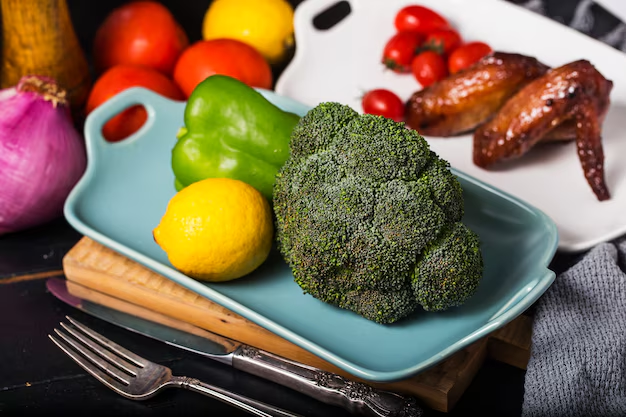How Long Can You Refrigerate Fresh Broccoli Before It Wilt?
Few vegetables hold a reputation as strong as broccoli in the world of nutrition. Rich in vitamins, minerals, and antioxidants, it’s a staple in many households worldwide. But as most of us strive to maintain the perfect healthy diet, a practical question arises: How long does fresh broccoli last in the refrigerator? Knowing this can help reduce waste and ensure your meals are as nutritious as possible. Let’s dive in to explore the shelf life of fresh broccoli and related food storage tips.
Fresh Broccoli in the Refrigerator: What to Expect
The Shelf Life of Fresh Broccoli
When stored properly in the refrigerator, fresh broccoli can last between three to five days. This duration can vary slightly based on several conditions, such as the initial freshness at the time of purchase and the temperature of your refrigerator.
Key Takeaways:
- Duration: 3-5 days in the refrigerator.
- Factors affecting shelf life: Initial freshness, storage method, and refrigerator temperature.
Recognizing Freshness
Fresh broccoli is characterized by its bright green color, firm stalks, and tightly clumped florets. As broccoli begins to lose its freshness, you'll notice:
- Yellowing of florets.
- Limp stalks and soft spots.
- A strong, unpleasant odor indicating spoilage.
Proper Storage Techniques for Fresh Broccoli
How to Extend Broccoli’s Shelf Life
Storing Without Washing: It’s best to store broccoli unwashed in the refrigerator, as excess moisture can accelerate spoilage. Wrap it loosely in paper towels to absorb any condensation and place it in the refrigerator's crisper drawer.
Optimal Storage Tips:
- Wrap broccoli heads loosely in a paper towel.
- Place in an open plastic bag to allow ventilation.
- Store in the crisper drawer for optimal humidity control.
The Role of Temperature
Temperature plays a crucial role in prolonging the freshness of broccoli. The ideal refrigerator temperature for storing broccoli is around 32 to 36°F (0 to 2°C). Ensure your refrigerator maintains this temperature range to keep your produce fresh for as long as possible.
Vacuum Sealing for Longer Freshness
For those who own a vacuum sealer, vacuum sealing broccoli can extend its shelf life even further by reducing exposure to oxygen. This method can potentially double the storage time, keeping the vegetable fresh for up to ten days in some cases.
Preventing Waste: Using Broccoli Before It Spoils
Creative Ways to Use Broccoli
Instead of allowing your broccoli to spoil, consider these creative culinary ideas:
- Soups and Stews: Broccoli adds rich flavor and nutrition.
- Stir-Fries: Pair it with other vegetables for a quick dish.
- Roasted Broccoli: A delicious side dish that brings out its natural sweetness.
Freezing as an Option
Freezing Fresh Broccoli:
- Blanch First: Quickly blanching broccoli (boiling briefly followed by an ice bath) before freezing helps preserve its color, flavor, and nutrients.
- Freeze in Portions: Cut broccoli into smaller pieces and freeze them in portion-sized batches.
- Shelf Life in Freezer: Broccoli can last up to 12 months when properly frozen.
Nutritional Benefits of Fresh Broccoli
Why Broccoli Deserves a Spot in Your Fridge
Broccoli is more than just a versatile culinary ingredient; it’s a powerhouse of nutrition. Here are some notable benefits:
- Rich in Vitamins: Excellent source of vitamins C, K, and A.
- Mineral Content: Contains potassium, iron, and calcium.
- Antioxidants: Packed with antioxidants that support overall health.
Supporting a Balanced Diet
Incorporating broccoli into your diet can aid in maintaining a balanced nutritional intake. It complements other foods and can be included in various dietary plans, catering to both vegetarians and meat-eaters alike.
Nutritional Highlights:
- Low in calories: Making it perfect for weight management.
- High in fiber: Contributing to digestive health.
Troubleshooting: When Broccoli Goes Bad
Signs of Spoilage
It's crucial to recognize when broccoli has gone past its prime. Watch for:
- Mold Growth: Any signs of mold indicate that it’s time to discard.
- Unpleasant Odor: A strong odor suggests bacterial growth.
- Florets Turning Yellow: This indicates aging, though still safe to eat if not irreparably soft or smelly.
Avoiding Mistakes
Common mistakes such as storing broccoli in closed containers or at the wrong temperature can reduce its shelf life. Make a habit of checking your stored produce regularly and adjust the storage methods as needed.
A Quick Guide to Broccoli Storage 🌿
| Tip | Description |
|---|---|
| 🌡️ Keep Cool | Store broccoli at 32 to 36°F. |
| 👚 Wrap It | Use paper towels for moisture control. |
| 🎛️ Use the Crisper | Helps maintain the right level of humidity. |
| 🕐 Mind the Clock | Consume within 3-5 days for peak freshness. |
| ❄️ Freeze for Longer Storage | Blanch and freeze to extend shelf life to 12 months. |
Is Fresh Always Best?
While fresh broccoli is often preferred for its taste and texture, frozen broccoli is a viable alternative if used correctly. Frozen options retain much of their nutrient content and can be a convenient choice for busy households. Still, fresh broccoli, when used within its optimal storage time, provides a crispness that frozen produce often lacks.
Concluding Thoughts: Tracking Freshness is Key
Understanding how long fresh broccoli lasts in the refrigerator is central to maximizing its nutritional benefits and minimizing waste. By employing smart storage techniques, consuming it within the optimal time frame, and recognizing signs of spoilage, you can ensure that your broccoli remains a vibrant and valuable part of your diet. Remember, the journey from farm to table doesn't end with the purchase — proper storage is just as crucial as proper cooking in unlocking the full potential of this leafy green.

